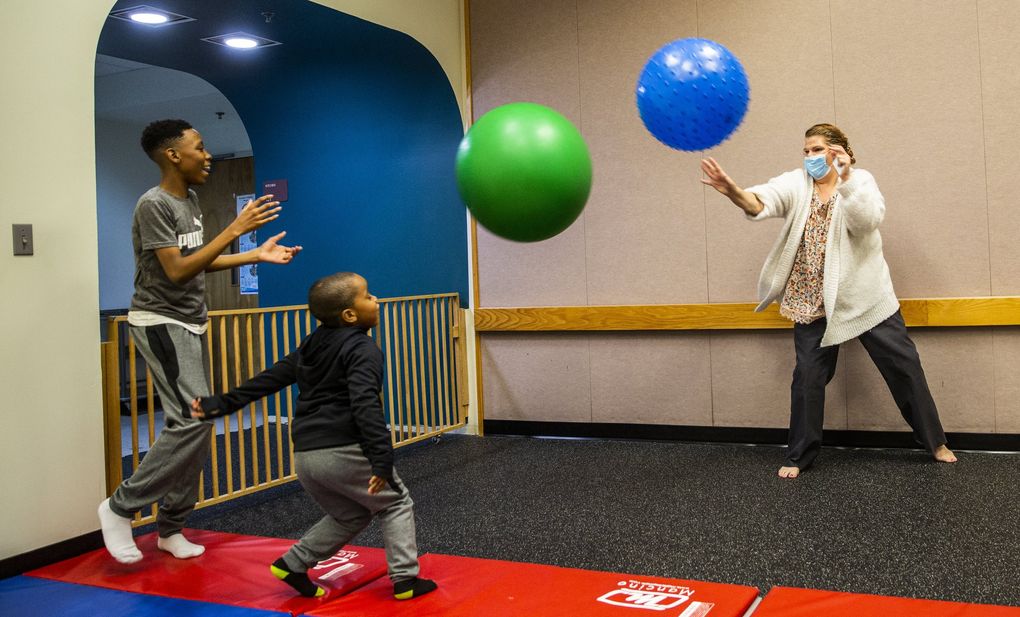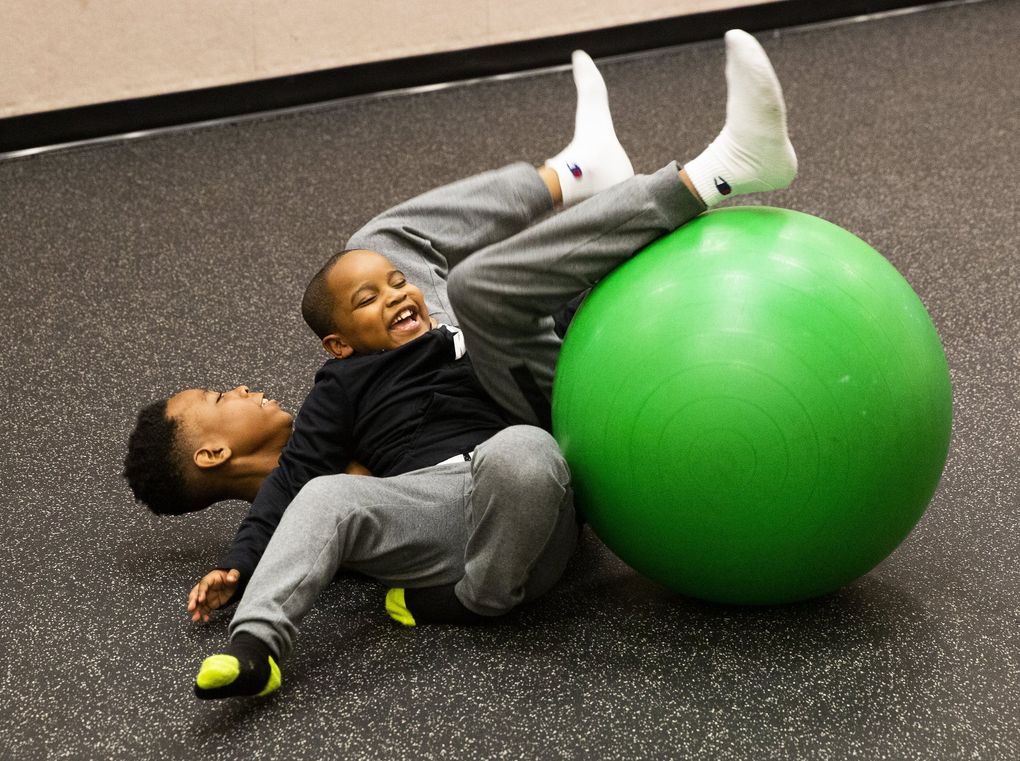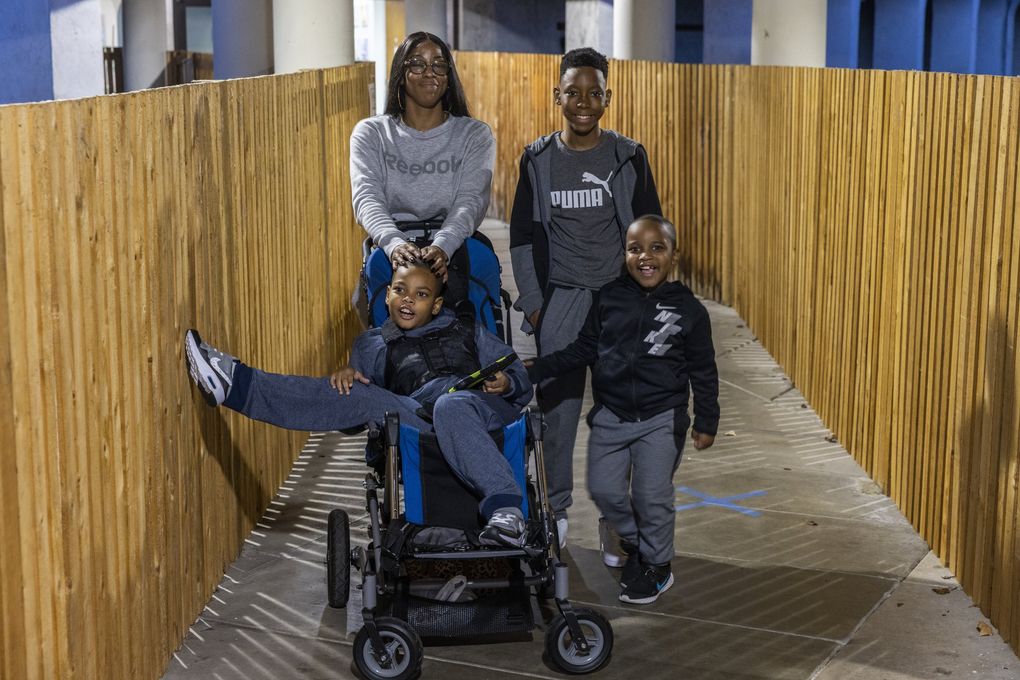Childhaven Featured in Seattle Times Fund for Those in Need
Healing childhood trauma in the Seattle area with arms around the whole family
By Christine Clarridge Seattle Times staff reporter
Photo credits to Daniel Kim Seattle Times photographer
Carneisha Grace, 34, was going to take care of her special-needs son and his two brothers on her own, no matter what. She thought self-sufficiency was the mark of a good mother. But when the end of a long-term relationship left her homeless, and her son Shawn was still not walking or talking, she struggled. Childhaven reached out to her, and she was finally ready to accept support.
Now, with help from the agency, one of the 13 nonprofits that benefits from readers’ donations to The Seattle Times Fund for Those in Need, Grace is stably housed and her children are flourishing. "We're not meant to do it alone," she said during a recent visit to Childhaven's branch in Auburn. "Don't be afraid to ask for help and don't be afraid to take it. We all need it. Learning that changed everything for us." The tangible assistance with day care, education, therapy and housing that Childhaven and its partners throughout the community provided were critical, she said.
But so were the thousands of little lessons she’s learned along the way: how to play with her kids, practice patience when it’s running thin, communicate clearly when frustration is high and take a few minutes for herself when needed. Her youngest son, Samari, 5, is doing well in school at Childhaven, where he's enrolled in the Wraparound with Intensive Services program that allows the agency to keep its connection with the whole family.

Josiah, 12, is at Rainier Middle School, where he recently shot a game-winning basket. Shawn, 9, is now able to walk and communicate. He is fond of calling the family’s friend and facilitator at Childhaven, Barbie Jo Wagner, and asking her, “What’s going on?”
Wagner was Shawn’s first teacher at the agency. She later became the family’s case manager and a parent partner, which is what Childhaven calls staff members who have experienced and overcome many of the same struggles their clients face. "Sometimes people ask if seeing all the need can get you down," Wagner said. "But when I see Shawn lighting up and playing and see how resilient mom is and how well the other kiddos are doing, it's wonderful and so worth it. I love seeing them thrive and grow."
Each year, The Seattle Times Fund for Those in Need raises money for charities that help children, families and senior citizens. Throughout the season, we’re telling the stories of people and organizations who make a difference in the lives of thousands, and the impact donors can have.
Founded more than 100 years ago as a day nursery, Childhaven was the first on the West Coast to implement the federal Head Start child development program to provide a year-round preschool program to help prepare young children for school.
Childhaven works to address the childhood trauma and adversity that are the root causes of the most urgent and costly problems that plague children, families and communities. Over two-thirds of children in the United States are exposed to some form of toxic stress from multiple possible causes, including domestic violence, abuse, neglect, racism, illness, indifference and bullying, according to the agency. Children who experience early adversity carry the impact long into adulthood with studies now showing links to crime, drug abuse, suicide, homelessness, mental health issues and even cancer and diabetes.
Grace was in foster care most of her childhood. A little hellion, according to her own description, she was not adopted even after her picture and profile were featured as a child needing a forever home in The Seattle Times. She had fun running the streets for a while, she said, but when she became pregnant, she vowed she would parent better than she'd been parented.
When her second son was born with Dravet syndrome, a rare form of intractable epilepsy that causes seizures and developmental delays, she was told he would probably not live past 5. "I didn't know what to do. I didn't know there was help for parents with special-needs kids. I just curled up into a ball," she said. "Let me tell you this: Depression is real."
After the dissolution of a relationship forced her and the children into a Seattle-area shelter, she learned about Childhaven and the ways they could help. She was not eager at first - past experiences with social agencies made her feel like she was being lectured at, criticized and not heard, she said.
But Childhaven recently underwent a complete “paradigm shift,” to avoid that, said Mark Fadool, the agency’s Chief Programs and Operations Officer. “We’ve gone from the mindset of thinking that we are the experts to understanding instead that they are the experts. It’s a major overhaul.”

The agency’s new flexibility followed a period of “listening deeply” to families and communities, Childhaven’s CEO Jon Botten said in a recent interview. Parents know their needs and their children’s needs better than anyone, he said. Healing happens when people feel safe and supported, the agency says, so Childhaven takes the time to build trust-based, face-to-face relationships with parents and children.
Recent mergers with Art with Heart and Renton Area Youth and Family Services as well as partnerships with other community-based organizations, such as the Renton Innovation Zone Partnership, Renton School District and the Skyway Coalition, are helping the agency expand its reach and broaden its impact, agency officials said.
Childhaven now has a cornucopia of offerings, such as Kaleidoscope Play and Learn, Healthy Start and the pioneering Family Navigation program that together aim to provide families with one-stop, comprehensive assistance. The breadth of offerings allows Childhaven and all its new partners to meet people in their homes, schools, community centers and shelters.
The agency’s first priority is meeting people where they are with what they need, making services convenient and developing more continuum of care, Botten said.
Another top priority is expanding the number of people helped each year. Last year the agency served more than 2,000 children, youth and families with therapeutic services including early learning and child and family counseling.

In explaining the intense focus on mental health assistance, the agency’s communication director Knox Duncan said, “We believe early childhood mental health has the potential to change the world and our community.” A network of supportive adult connections early in a child's life buffers the effects of trauma and adversity, builds resilience, and lays the foundation for optimal and lifelong health and well-being, he said.
“I feel like we are doing great,” Grace said. “I have my own car, my own home and I pay my own bills. I’ve got everyone on a schedule and we are doing better than ever.”
“I have to say, the resources are out there if you want them,” she said. “But it’s up to you to take them. Don’t lose out on an opportunity to better parent and a better person overall. Don’t be scared, don’t be ashamed. There is help, really good, life-changing help, out there.”
Read the full article on The Seattle Times website.
